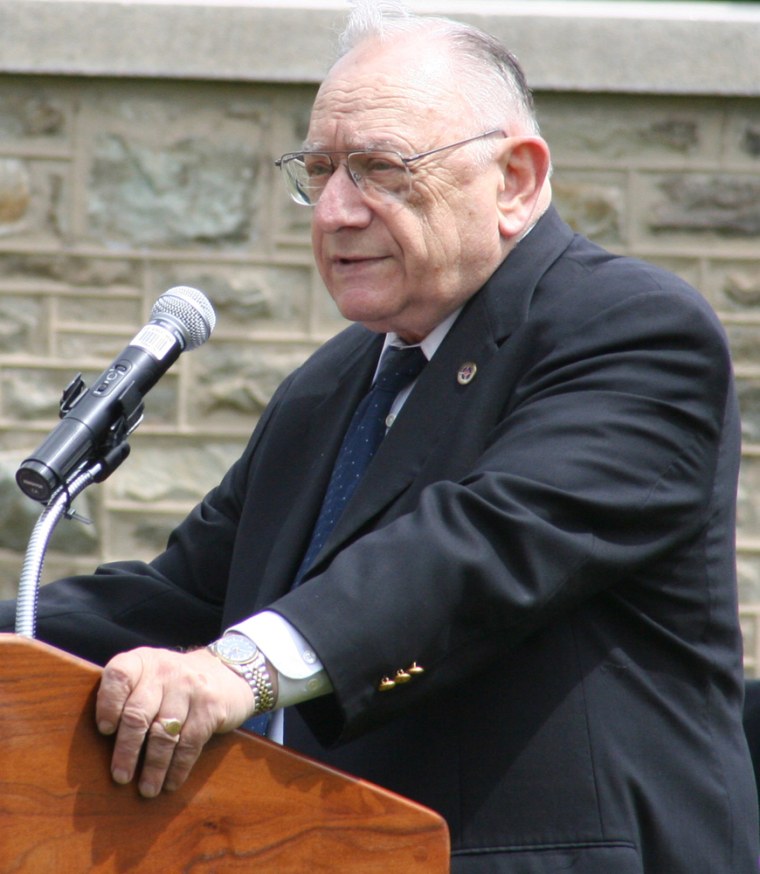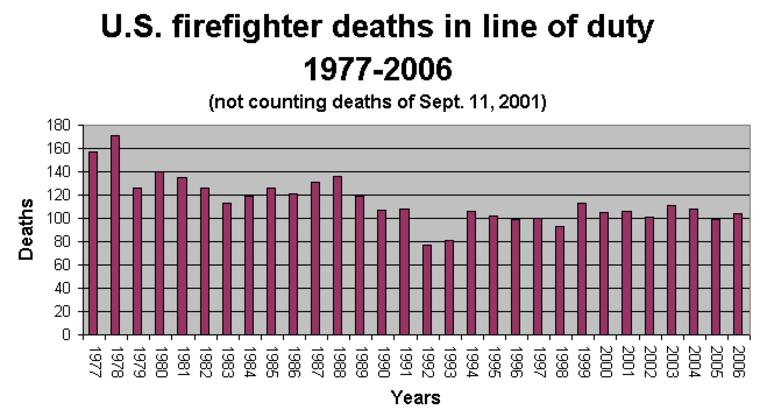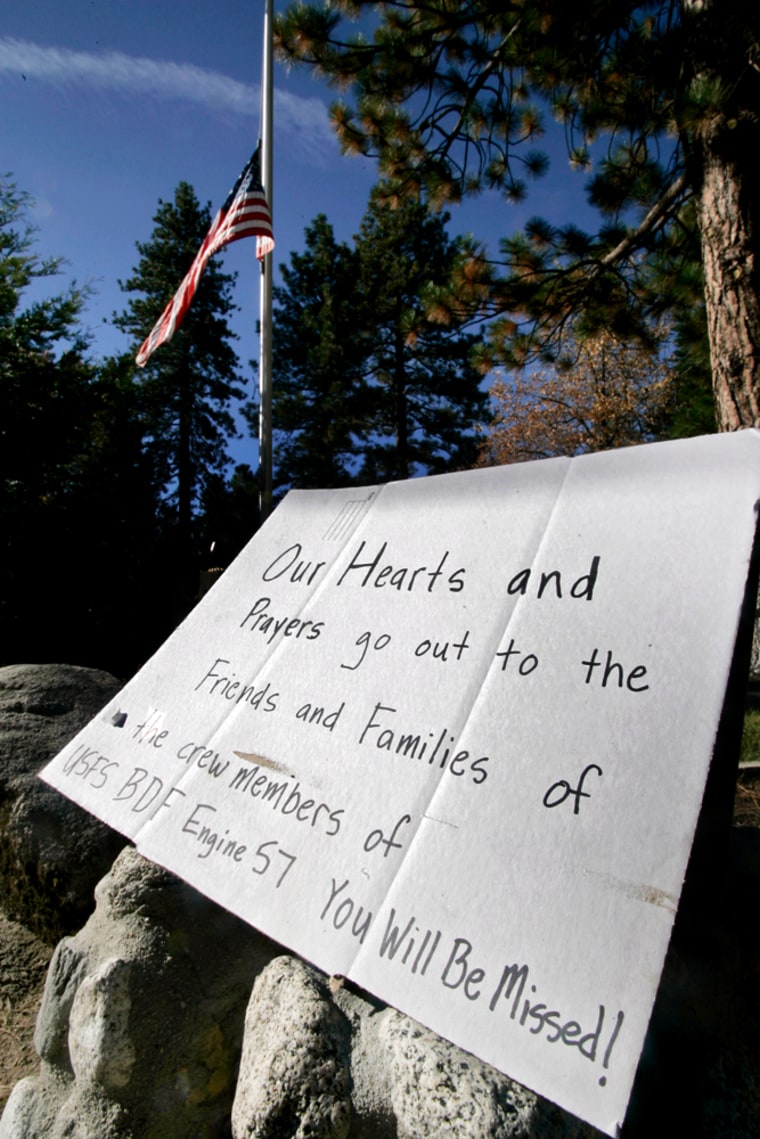A foundation representing firefighters who die in the line of duty is calling for Congress to strip the Centers for Disease Control of its role investigating firefighter deaths. But the firefighters union, which helped give that job to the CDC in the first place, says the investigations need more funding and authority, not different leadership.
The groups were reacting to an msnbc.com investigation describing how the CDC blocked inquiries by its own safety engineer into potential problems with firefighter equipment; usually takes more than a month to send investigators to the scene of a fatality; doesn't investigate if the fire union or a fire department refuses to cooperate; has cut back in the past three years on the percentage of firefighter deaths it looks into; and destroys information that could help identify patterns of problems with safety equipment, training or tactics.
"There is no excuse for delaying or failing to investigate a line-of-duty death," said Hal Bruno, chairman of the National Fallen Firefighters Foundation, a nonprofit group set up by Congress to remember firefighters who die in the line of duty.

Bruno, a former ABC newsman and a volunteer firefighter for 40 years, said Congress should return the role of investigating firefighter fatalities to the U.S. Fire Administration, an agency in the Department of Homeland Security.
"It should be the responsibility of the United States Fire Administration, which should be given the funds, the resources and the personnel that are needed to carry out this critical mission," Bruno said.
Congress gave the job to the CDC in 1998, but the CDC has said that the firefighter program's $2.5 million budget isn't enough to investigate every death. The CDC's Fire Fighter Fatality Investigation and Prevention Program is part of the National Institute for Occupational Safety and Health.
Bruno said that money may be an issue, but the main problem is the CDC unit's lack of a sense of urgency.
"The results of every investigation should be made public as fast as possible so that the lessons learned can be used to save lives," Bruno said. "If there is a problem with any piece of equipment used by a firefighter — whether it's a vehicle, a tool or a protective device — that equipment must be tested to determine how the problem can be corrected. Again, this must be done with a sense of urgency and the entire fire service must quickly be made aware of any danger to firefighters. This is the way it was done in the past; this is how it should be done now and in the future.
‘New lessons should be learned’
"Whenever a firefighter dies in the line of duty, these things must happen simultaneously," Bruno said. "The fire-rescue service must honor the memory of their fallen comrade and do all that we can to support their family in a time of need. At the same time, there must be an immediate, thorough and impartial investigation to determine what went wrong — what new lessons should be learned, what old lessons need to be re-emphasized — so that steps can be taken to prevent it from happening again."
By urging that the investigative role be taken from the CDC, the firefighters foundation goes further than two other groups — the International Association of Fire Chiefs and the International Association of Fire Fighters — both of which said last week that the federal investigators should no longer delay responding to fatalities, and that Congress should allocate more money to improve the depth of the investigations. The National Fire Protection Association, which sets standards for fire equipment, also urged quicker action and more funding.
The firefighters union, which helped get the CDC's program funded by President Bill Clinton in 1998, said Tuesday that moving the job to the U.S. Fire Administration wouldn't help.
"The USFA did the investigations before, and they didn't do any better job," said spokesman Jeff Zack. "The problem was, and continues to be, a lack of funding."
He said the CDC needs more authority to take over an accident scene — but not before it has the money to do that job well.
As for a CDC manager's direction to her investigator to "minimize your fact gathering" in regard to equipment problems, Zack said that neither more money nor more authority would cure that problem.
‘Insufficient will’
"There has been been insufficient will to literally point fingers when problems are found," Zack said. He said that reluctance to place blame extends up and down the fire service, whether a firefighter's death involves failures by the fire department, the firefighter or a manufacturer of safety equipment.
A spokesman for the CDC said it welcomes the conversation, but didn't address the question of shifting the role to another agency.

"We all share the same goal here. We want to protect firefighters and keep firefighters from dying," said the CDC's Fred Blosser. "We always want to hear from the fire service partners, and if they have recommendations it's always useful to talk with them. If they think there should be changes, we want to talk with them and understand where they're coming from, to see what the consensus is."
About 100 firefighters a year die in the line of duty in the U.S. Heart attacks on the job and vehicle accidents on the way to the fires account for about half. The other half are traumatic deaths while fighting fires.
